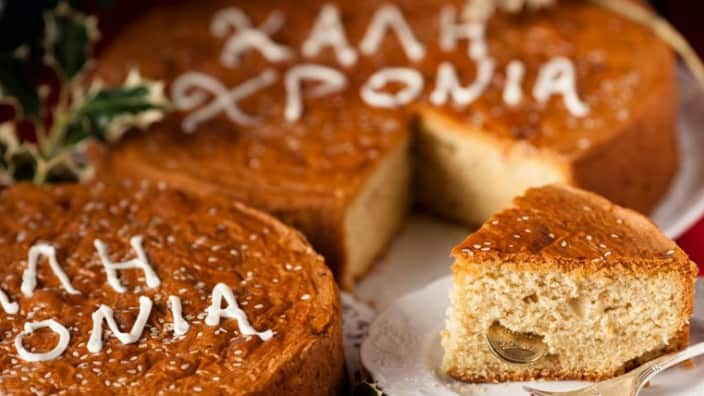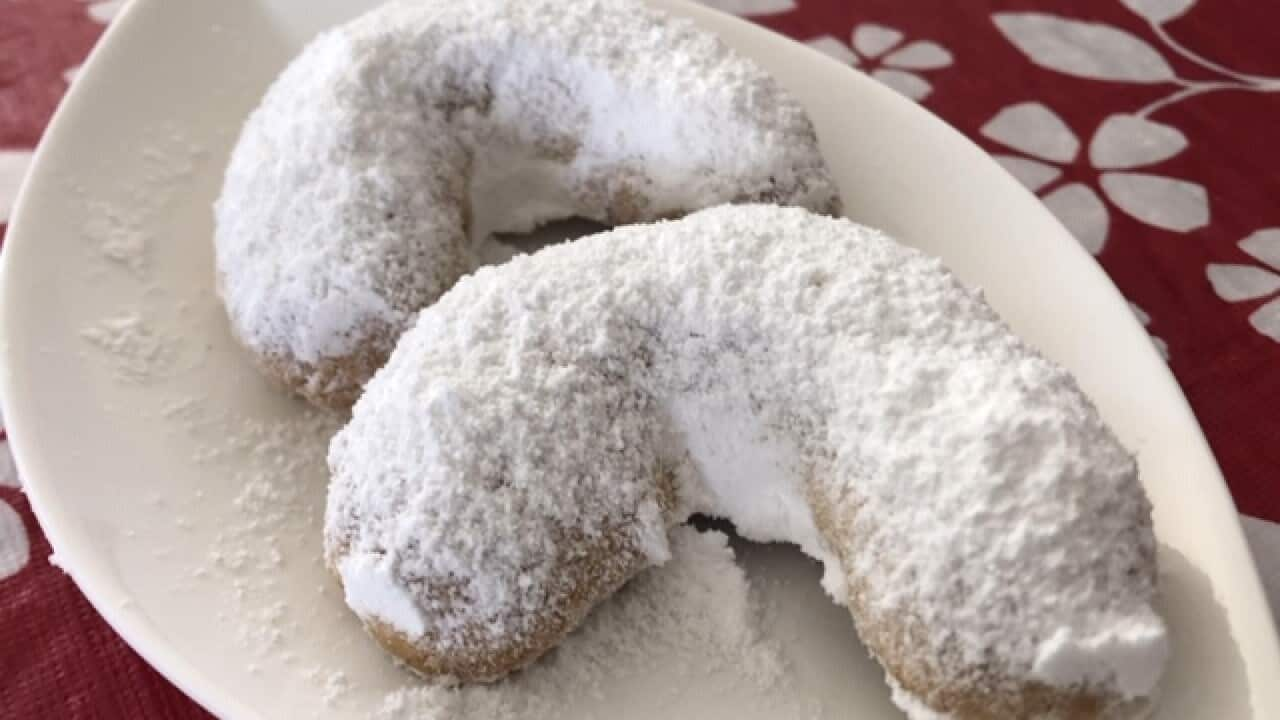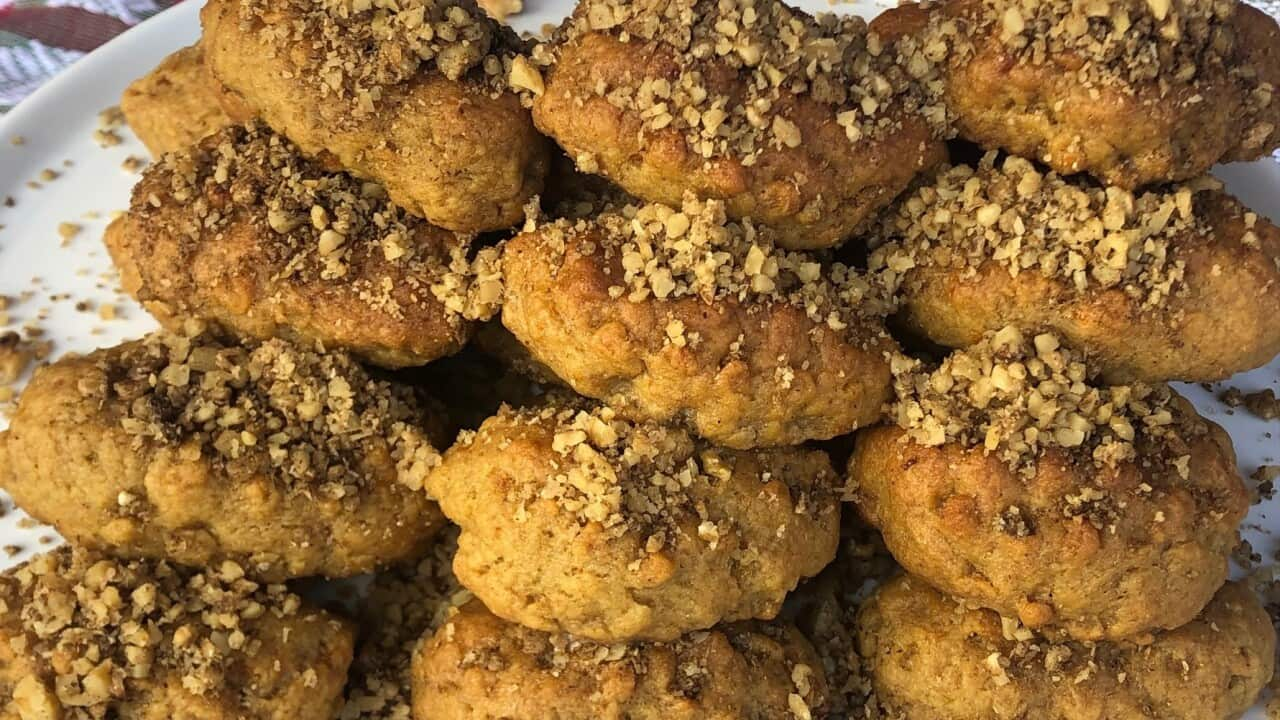With the second largest Greek population outside of Greece, Australia plays host to plenty of Greek Christmas celebrations every year. If you find yourself pulled into a Big Fat Greek Christmas in Australia this year, here’s what you need to know to survive the festivities.
Don’t exhale, sneeze or choke when eating 'kourabiedes'
Every important Greek cultural event is associated with food.
Kourabiedes, butter cookies covered in liberal amounts powdered sugar, and melomakarona, cookies flavoured with cinnamon, cloves, and/or orange, are the most common sweet treats you will find in every self-respecting Greek home, before and during the festive season.
Be careful of the Kourabiedes' powdered sugar, and remember, that if you are planning to sneak a treat, kourabiedes will leave sugary evidence wherever they go.

Kourabiedes (R) and melomakarona (L) are traditional Greek Christmas treats (Getty Images) Source: Getty Images
The Christmas 'kalanda' tradition
Do you live in a suburb with a large Greek population? Good luck!
Tradition calls for Greek children to go from house to house on the eve of the three main end-of-year festive holidays - Christmas, New Years and Epiphany (January 6) - and sing carols or ‘kalanda’ in Greek.
At dawn on those days, small, medium and big kids will begin ringing door bells, asking, “Na ta poume?” which means, “Shall we sing them?”
At the end of the carols, you’ll be expected to give them a tip, or a small treat.

Tradition calls for the children to go from house to house and sing carols (kalanda) (Image Source: Pixabay) Source: Pixabay
Why do Greeks decorate little model boats at Christmas?
Don’t get us wrong. We love our Christmas trees.
But as Greece is an ancient maritime country, the decoration of traditional fishing boats dates back hundreds of years to when the majority of Greeks were working at sea.
During Christmas, the family would decorate a small wooden boat to symbolise their thanks for the safe return of fishermen against the odds of nature and harsh winter seas.
To date, many Greek municipalities make commendable efforts to restore the custom to its original form, with boats adorning the central city squares instead of the typical giant Christmas tree.

Τhe decoration of the fishing boat dates back hundreds of years when the majority of Greeks were working at sea (Image Source: Municipality of Rhodes) Source: Municipality of Rhodes
The Big Fat Greek Christmas table
Have you ever gone on a diet ahead of the festive season to prepare for feasting? Congratulations, you’ve participated in a Greek tradition!
In fact, older Greeks prepare for Christmas by fasting for 40 days, after which they dine on a huge feast. Pork or lamb dishes are typically the main part of these feasts, with a barrage of appetizers and desserts thrown in to round out the meal.
Be prepared for a long day of eating, drinking and listening to 10 different conversations (covering politics to sports to the latest hairstyles) taking place around the table, all at the same time.

Slow Roasted Lamb Shoulder is a traditional dish for Greek Feasts (source: Unsplash) Source: Unsplash
When does Santa visit Greece?
The Greek Santa Claus is known as ‘Ayios Vassilis’. Ayios Vassilis traditionally comes on January 1 rather than December 25, and this is when people usually exchange gifts.
Remember not to give knives, scissors or anything sharp as it is considered bad luck!
Don’t swallow the coin in the cake!
In Greece, families bake a special New Year’s Day cake called ‘vasilopita’ and place a coin (‘flouri’) inside it. The cake is to be consumed at midnight on New Year’s Eve or on New Year’s Day.
READ MORE

New Year's Cake: The recipe
The oldest member of the family will make a cross on the pie as a blessing and then cut a piece for every member of the family and any visitors present.
The lucky person who gets the piece with the coin inside is said to be blessed with good fortune and health for the whole year and is usually given a present. Chew carefully!

In Greece, families bake a special New Year’s Day Cake (vasilopita) and place a coin (flouri) inside it (source: Getty Images) Source: Getty Images
Some useful Greek phrases for the holidays:
‘Kala Hristougenna’ – Merry Christmas
‘Kali Protohronia’ – Happy New Year
‘Kali Hronia’ – Good Year



